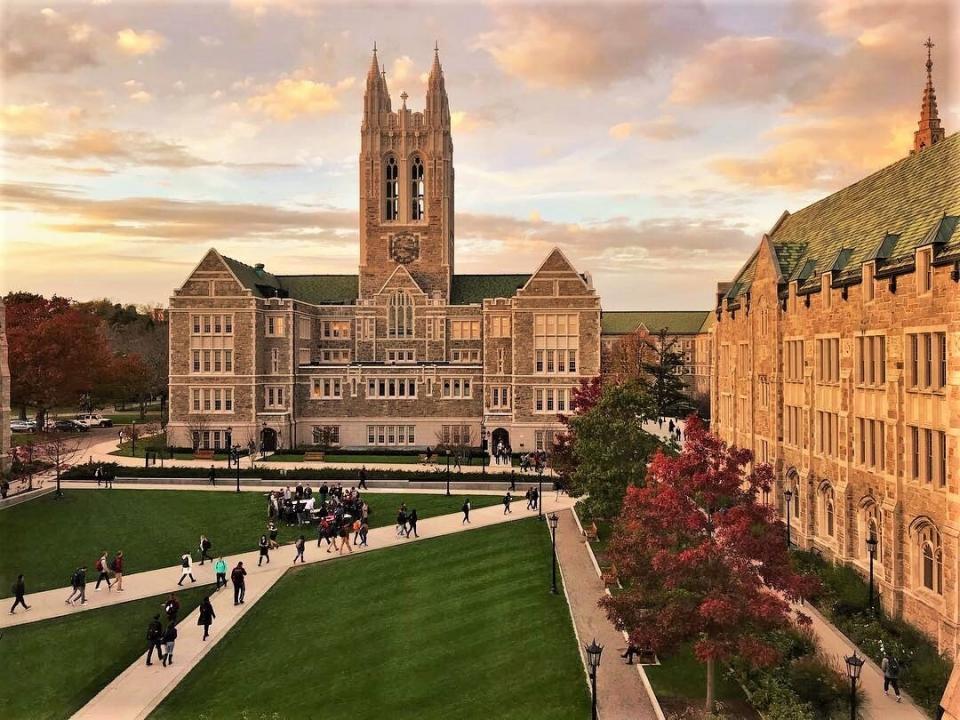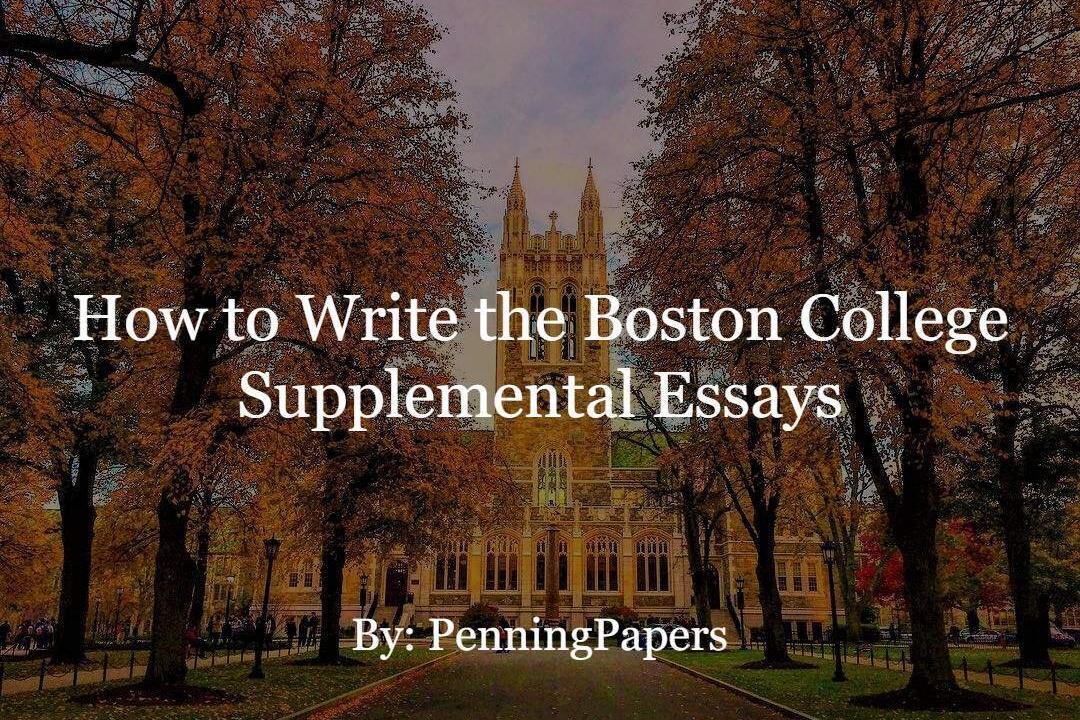In this article, we’ll be covering everything you need to know about how to write the Boston College supplemental essays.
Boston College is a highly competitive school with an acceptance rate of 19%. Here are the stat ranges for average admitted students.
Boston College stats for admitted students class of 2025
- GPA: A/A- range for the most rigorous course load available at their respective institution.
- SAT: 1460-1540
- ACT: 33-35
They practice a holistic admissions process, which means that they not only value academic performance but unique talents, teacher recs, essay quality, and outside achievements as well. Here is what they have to say about their admissions process on the website.
“We review each application with a level of thoroughness and thoughtfulness that reflects the time and effort you have invested in Boston College. In making admission decisions, we consider grades, standardized test scores, what you do outside of school, teachers’ and others’ appraisals, and how you express yourself through writing.“
Boston College Official Website
Because the average student applying is at the top percentile of academic performance, the chances of getting accepted through high grades and test scores alone are slim. Everyone has high marks. Thus, Boston College must value other elements such as the quality of your essays more. That is how they differentiate between multiple students with 4.0 GPAs.
As such, if you want to have a solid chance at getting accepted into Boston College, your essays must be stellar enough to stand out amongst the rest of the application pool. The admissions office’s job is to analyze your essay and determine why your writing makes you a strong fit for the school.
So, your job must be to write something that helps them do exactly that: essays that stand out.
This guide will cover each of the Boston College supplemental essays in-depth and how to write them to differentiate yourself from the rest.
Table of Contents
- Boston College Supplemental Essays
- Students at Boston College are encouraged to consider critical questions as they pursue lives of meaning and purpose. What is a question that matters to you and how do you hope Boston College will help you answer it?
- In 2020, we faced a national reckoning on racial injustice in America – a reckoning that continues today. Discuss how this has affected you, what you have learned, or how you have been inspired to be a change agent around this important issue.
- At Boston College, we hope to draw on the Jesuit tradition of finding conversation partners to discuss issues and problems facing society. Who is your favorite conversation partner? What do you discuss with that person?
- Socrates stated that “the unexamined life is not worth living.” Discuss a time when reflection, prayer, or introspection led to clarity or understanding of an issue that is important to you.
- Each year at University Convocation, the incoming class engages in reflective dialogue around a common text. What book would you recommend for your class to read and explore together – and why?
- Human-Centered Engineering (HCE) Applicants: One goal of a Jesuit education is to prepare students to serve the Common Good. Human-Centered Engineering at Boston College integrates technical knowledge, creativity, and a humanistic perspective to address societal challenges and opportunities. What societal problems are important to you and how will you use your HCE education to solve them?
Professional College Application Help.
Contact us. We'll get to you within 24 hours.
Boston College Supplemental Essays

“We would like to get a better sense of you. Please respond to one of the following prompts (400 word limit). Applicants to the Human-Centered Engineering major will select the 6th prompt.“
Boston College Common App Website
The Boston College supplemental essays don’t all have to be answered. You just need to choose one.
The school will not discriminate against you based on what question you choose. However, some questions may be capable of bringing forth more interesting essays. For instance, you may have a question about moral relativity for the first Boston College supplemental essay prompt that is very strong. But, you may not be able to answer the fourth one very well.
You need to choose a prompt that you not only will be able to answer well but also one that will show the strongest side of you.
While we cover each of these questions, consider just how you would appear to admissions officers whilst answering these questions and what character traits they can infer from it.
Students at Boston College are encouraged to consider critical questions as they pursue lives of meaning and purpose. What is a question that matters to you and how do you hope Boston College will help you answer it?

Answering this question shows Boston College that you are, at heart, a true thinker and student. Most people apply to college for the purpose of furthering their careers. However, few remember that the point of college is to further the quality of knowledge.
This question also shows admissions officers at Boston College where your priorities are. Someone who questions the existence of life in outer space has different priorities from one who questions the validity of egalitarian economies from a financial perspective.
Be careful whilst answering this question. It is easy for students to want to demonstrate their intellectual prowess by having all the answers to complicated questions. But, remember: if you’re applying as an undergraduate Freshman, you’re likely only 18-19 years old. It’s next to impossible to have a sophisticated answer that is completely correct.
In fact, you don’t want to have this attitude in any of the other Boston College supplemental essays at all. It’s crucial you balance both strength and humility in all of them.
Remember to show admissions officers humility by demonstrating that you don’t have all the answers, or at least that you are open to learning at Boston College the answer to your question. This element is especially important since Boston College is a place of learning. Showing that Boston College can answer your question specifically is a demonstration of your dedication and desire to attend the school.
In 2020, we faced a national reckoning on racial injustice in America – a reckoning that continues today. Discuss how this has affected you, what you have learned, or how you have been inspired to be a change agent around this important issue.

One of the most difficult problems facing students who want to write their college essays on racial injustice is the fact that the topic does not give much leeway for the student’s individuality.
Severe circumstances and issues surrounding racial injustice seem to be shocking in and of themselves. These moments can easily overshadow students and their own personal unique qualities or individuality. In fact, this is one of the most common problems our clients face when writing their college essays on racial injustices.
For instance, we’ve had clients who wrote much about their experience helping advocate for equality during protests and demonstrations. However, their empathetic temperament made them more likely to focus their attention on the victims. This is understandable. However, the main purpose of a college admissions essay is to write about oneself.
This is where the problem sets in. In cases of racial injustice, it is more sensible to make the main focus on the victims and provide them a voice instead of focusing on themselves. However, for the sake of the college admissions process, the focus must stray away from the cause and zero in on the writer. Thus, the admissions process and its necessity to focus on the writer would make writing about racial injustice difficult to do in a fair way.
When someone writes about their protest during a Black Lives Matter rally, do they just focus more on what they felt rather than the overall cause and its noble visions? If so, they take away from the voice of the oppressed whilst profiting off their suffering by getting into a good school.
See how this becomes problematic?
Now, there are nuances to this. We’ve seen essays that can balance giving a voice to those who were victims of racial injustice whilst zeroing in on the writer’s personal qualities. These essays, however, need to be written with a careful hand. Answering this question in a manner that both demonstrates your moral virtue in a positive light whilst giving the victims the proper recognition is hard. Doing so without giving admissions officers the idea that we’re capitalizing off of victims is even harder. But, if done right, it is certainly worth it.
If you are writing the Boston College racial injustice supplemental essay, we highly recommend that you speak with a professional college admissions essay advisor and editor. At PenningPapers, we have the expertise that many other admissions advisors and counselors don’t; we also go above and beyond to provide you with advice that actually helps.
At Boston College, we hope to draw on the Jesuit tradition of finding conversation partners to discuss issues and problems facing society. Who is your favorite conversation partner? What do you discuss with that person?

In this prompt, Boston College refers to its tradition of finding partners to talk about world problems with. You may think of this as a philosophical temperament and something they look for in their applicants. So, it probably goes without saying that if you want to answer this prompt, you might want to write about a conversation partner who actually talks about the meaningful world or societal problems with you.
This means basic topics such as parking spaces, internships, that one web novel you read, and other minimal subjects should generally be avoided.
Keyword generally.
This, however, is not always a hard and fast rule. You can sometimes write about basic and simple topics you talk about with friends if they subtly nudge toward greater issues surrounding society.
Here’s an example:
“Clock. Tick. Bell. Ring. Door. Open.
My conversations with Amelia start off in quite the same way: the doors open and let forth a cacophony of students flooding to the Cafeteria for lunch time to get the best meals, as the cold and dry pizzas are typically reserved for the late. Though, us two didn’t mind being late. We liked the slow walk there.
The brick walls were our refuge. When we wait in line for pizza Friday —or Tuesday, or Thursday, it’s hard to say when every other day serves pizza— the wall edge facing the field was the spot we always had the talk.
Amelia would lean back on the wall, I’d follow, and she’d pull out her phone whilst it adjusted to the light. Spiderweb cracks scatter across her IPhone. Yet, through it still visible, is her newst crush for the day. Another male lead to the romance webtoon comic she was into.
‘Another “Duke of the North”, I know. But hey, he’s a beauty right?’
“Mmmhm.” I’d nod and smile along with her.
“Look at him. A man. A real shame boys in the real world aren’t all Dukes, huh?”
Except, that’s not what we really talk about. We do, sort of. But, it’s less about the cute boy of the day to crush over and more a yearning. Every day, every other pizza day regardless if it’s Friday or not, Amelia and I would speak of men, or the lack thereof. The afternoon sun across the field had that sort of forlorn effect on us.
Amelia is the girl I speak to when we talk about men. But, what do we know? We really are actually just asking each other: where are the good men? Sometimes it’s why can’t men be better? Other times it’s what should men be.
As two teenage girls, there’s only one real question we ask each other every day. I think it’s a question every girl asks themselves all the time: what is a man?”
Boston College Essay Prompt 3 Example
Don’t actually use this as a proper example of what a Boston College essay should look like. This is just an example of the principle we’re trying to demonstrate for educational purposes. So, it’s still imperfect and has some holes.
Look at this example above and recognize that this essay starts off with the idea that the applicant and their friend talk about basic things. They drool over fictional men in comics. Yet, the writing takes an unexpected twist and shows how the applicant, really, through the subtext, is actually having a deeper conversation with her friend. She talks with Amelia about how beautiful and amazing the men look; but, she truly talks with her friend about the lack of good men in the world.
This is a creative way you could do this. However, there is a disadvantage. This example essay has this blind spot.
Remember that the admissions office wants to see people who are not only complaining about world problems. Boston College benefits from people who talk deeply and have strong conversations that provide solutions to world problems. Of course, not everyone is like this. So, it’s okay to still be a teenager who doesn’t have the answer to everything. It’s just more appealing to admissions officers if they see you can hold a meaningful conversation that is intellectual in nature and not just ranting or complaining.
Socrates stated that “the unexamined life is not worth living.” Discuss a time when reflection, prayer, or introspection led to clarity or understanding of an issue that is important to you.

Introspection. Reflection. Prayer.
These words are actually all the same thing. To reflect, pray, and introspect is to ask for an answer genuinely.
So, in this prompt, Boston College is really asking you when there was an instance you asked yourself a question and therefore understood an issue better. The admissions office wants to see that you have the intellectual character to ask yourself questions and truly contemplate problems on a deeper level. This is the opposite of arbitrary assumption and the opposite of surface-level thinking.
Also, take note that in this prompt Boston College says you need to “Discuss a time when…” This means your main focus should be the actual thinking itself, and not the topic of introspection.
Remember: the admissions office is using your essay as a metric of your fit for the school. The topic or issue you think about can be fascinating and interesting to the admissions officers reading your essay, sure. However, their primary interest is going to be what your thinking process is like and how that makes you a great candidate for the school.
Therefore, you may want to elaborate on some of these questions before answering this essay prompt. Where do your answers to questions come from? Do you have any unconscious biases? Do you have any special methods of figuring out the truth? For example, do you start working from a First-Principles perspective and work your way up to the fact from there? Asking yourself this may help you elaborate more on what exactly your thought process is.
Each year at University Convocation, the incoming class engages in reflective dialogue around a common text. What book would you recommend for your class to read and explore together – and why?

Much like many other ones, the fifth Boston College supplemental question subtly shows admissions officers where their priorities are.
You have the choice of any book. You can only choose one. So, instead of any other book, you chose Aphra Behn’s Oroonoko. Why is that? Was there something about the fetishization of the other and racial injustice that was more important to you than say a book on particle physics?
If there is a reason one particular book interests you so much that you would choose to discuss it compared to any other book, then choose that one. Then, think about why exactly that book and its contents are something you think is worthy of reflective dialogue with the Boston College community.
Often, this insinuates that the Boston College students have something to gain from the book that they normally would not consider or have humored.
So, maybe Boston College’s interest and dedication to equality and inclusion can be productively debated through books like Alexander Solzhenitsyn’s The Gulag Archipelago would be a very interesting and productive book to discuss. For many students, the desire to overtake the inherently corrupt Capitalist system is very important. For many, the banner of equality and equity is something worth fighting for. However, Solzhenitsyn’s masterpiece presents crucial issues that challenge the belief in equity, as his experience shows that this banner is oftentimes a shroud for genocidal ideology.
This is an example of a great book that would be productive for Boston College. The university has a lot to gain from unconventional books that force readers to critically think and therefore articulate their thoughts on equality rather than just mindlessly parroting. Boston College, like any other school, values critical thinking. So, a book that challenges and forces readers to articulate their ideas is often a strong choice.
Human-Centered Engineering (HCE) Applicants: One goal of a Jesuit education is to prepare students to serve the Common Good. Human-Centered Engineering at Boston College integrates technical knowledge, creativity, and a humanistic perspective to address societal challenges and opportunities. What societal problems are important to you and how will you use your HCE education to solve them?

If you’re planning to take Engineering, or even have a good amount of Engineering experience under your belt, you’ll probably be all too familiar with the dichotomy that faces Engineers: vision vs. convention.
The deeper you get into Engineering, the more difficult it becomes to truly think like a visionary and solve societal challenges.
Let’s take manufacturing.
Everyone knows that accessibility to technology can change the world. After all, we have the power of the internet and more in the palm of our hands. We have phones that can do everything and small lightweight laptops that can do more than everything. Yet, if we can make things even more accessible, it’ll change the world forever.
What if that bulky laptop was just a little bit slimmer? What if our cars were just a little bit more fuel-efficient? What if we exchanged the metal properties in this product for something stronger and more lightweight? Just… a… little… bit.
Boom.
There goes your full paycheck.
Do you want something to work 10% more efficiently as an engineer? Well, it’s beans and rice for the rest of your and your employee’s days. Say goodbye to those sweet, sweet venture capital investments. Boom.
So, it’s not always as exaggerated as that. But, it’s often the case that Engineers can’t simply “Just solve that one problem society has.”
Now, this is where HCE comes in. Boston College is a place for like-minded visionaries to collaborate together to work on a common goal and solve societal problems. As an Engineer, you’ll have the expertise to collaborate with marketers, finance experts, and designers to develop something that will help solve world problems.
Thus, the best way of answering this prompt is to lay out both your strengths and weaknesses and how you will solve those weaknesses through collaborative learning from others. Maybe you are strong in Mathematics and Physics, but you lack the marketing skills to grow a startup from its initial phase. So, you work alongside other fellow Boston College students to learn from them and hopefully develop a future team to launch your startup. Don’t forget to write exactly HOW you will solve the world problem you’re writing about in detail. It helps to show admissions officers that you have a plan.
If you have any other questions about how to answer the Boston College supplemental essays, we would highly recommend scheduling a free consultation with our college admissions essay advisors and editors. Here at PenningPapers, we’ve helped students write essays that helped them get into many of their top choices and reach schools. So, don’t take the risk of tackling the admissions process without free help.

